The History of Wesleyan University and the United States Supreme Court
Throughout American history, the Supreme Court has played a crucial role in deciding cases and controversies – many of which have a deep impact upon the nation.
In my exhibit, I explore the history between Wesleyan University and the United States Supreme Court. My initial thesis is: Wesleyan has a deep history and connection to the United States Supreme Court. As the years have passed, the Wesleyan community’s reaction to the Court has changed from one that embraces conservatism to one that embraces progressivism.
This historical shift will be seen through the attendance of David Josiah Brewer at Wesleyan in the late 19th-century and the administration’s lack of support for Professor John Maguire during a Freedom Ride in 1961. In contrast, by the 1990s, the University embraced guest speaker Harry Blackmun, a liberal Justice, while protesting Justice Antonin Scalia in 2012. After the Court’s decision in Dobbs v. Jackson, which overturned a constitutional right to an abortion, the university responded by agreeing to cover abortion-related costs for students.
The Only Supreme Court Justice to Attend Wesleyan University: David Josiah Brewer

Supreme Court Justice David Josiah Brewer attended Wesleyan University from 1852 to 1854. Brewer was 15-years-old when he enrolled at Wesleyan and was active in the Peithologian literary society and the Mystical Seven, a secret literary society.
The son of Christian Missionaries, Brewer was a descendant of the prominent Field family, which included Justice Stephen J. Field (1863-1893). His father held a church pulpit in Middletown, Connecticut. Nominated to the Court by President Benjamin Harrison, Brewer served on the Court from 1890 to 1910. Jurisprudentially a conservative-leaning justice on the Supreme Court, Brewer opposed civil rights for African Americans and was a member of the majority in Lochner v. New York, which struck down vital economic regulations. Brewer’s background and conservative leanings were likely the norm among Wesleyan students at this time. However, Brewer also embraced natural law and aspects of Christian reformism when he voted to expand women’s rights (while on the Kansas Supreme Court) and Constitutional protections to residents of American territories (Insular cases).
The Arrest of Wesleyan Professor John Maguire During A Freedom Ride and the Apathetic Response From the University Administration in 1961
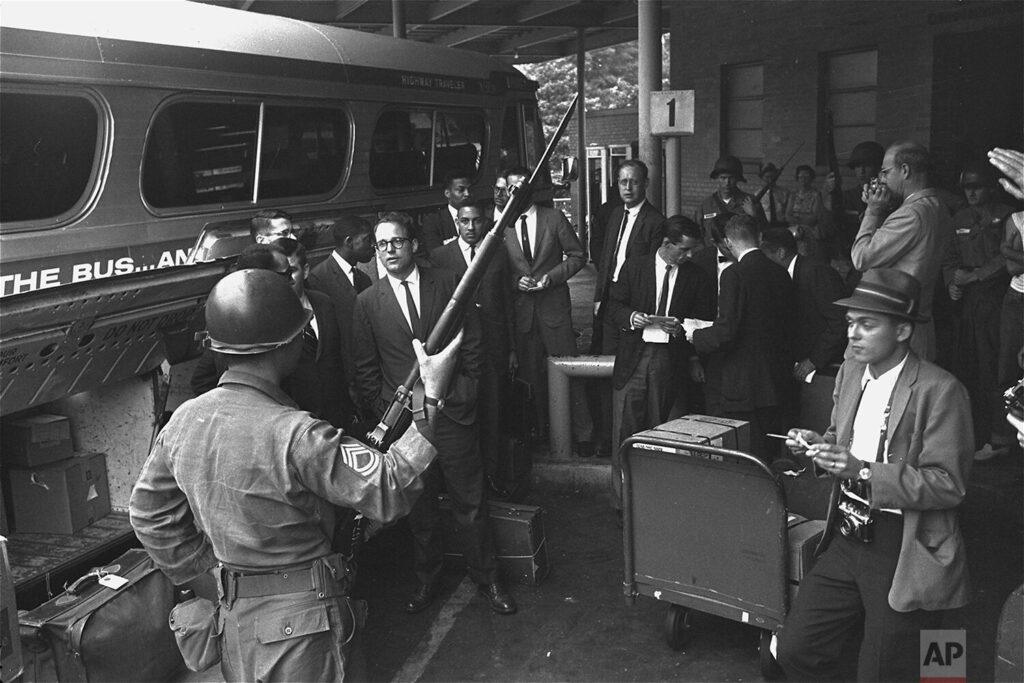
In May 1961, Professor of Religion, John Maguire, who taught at Wesleyan, helped organize a Freedom Ride in 1961 with the goal of ensuring the Supreme Court’s decision in Boynton v. Virginia, which outlawed racially segregated busing that crossed state lines. Joining Maguire on the Freedom Ride was fellow-Wesleyan professor, David E. Swift. During this Freedom Ride, Maguire took part in a test case of attempting to racially segregate a lunch counter at a bus station in Montgomery, Alabama. Maguire believed that the station’s policy was illegal, as it fell into the category of interstate commerce. Maguire was convicted of disturbing the peace and appealed his case to the United States Supreme Court – where he eventually prevailed.
However, Maguire received limited support from the Wesleyan administration. President Butterfield indicated in a letter to members of the institution that Maguire was acting as an individual and not on behalf of the university. Many older Wesleyan alumni sent Maguire anonymous threats in the mail.
Justice Harry Blackmun Visits Wesleyan and Delights the Student Body in 1993
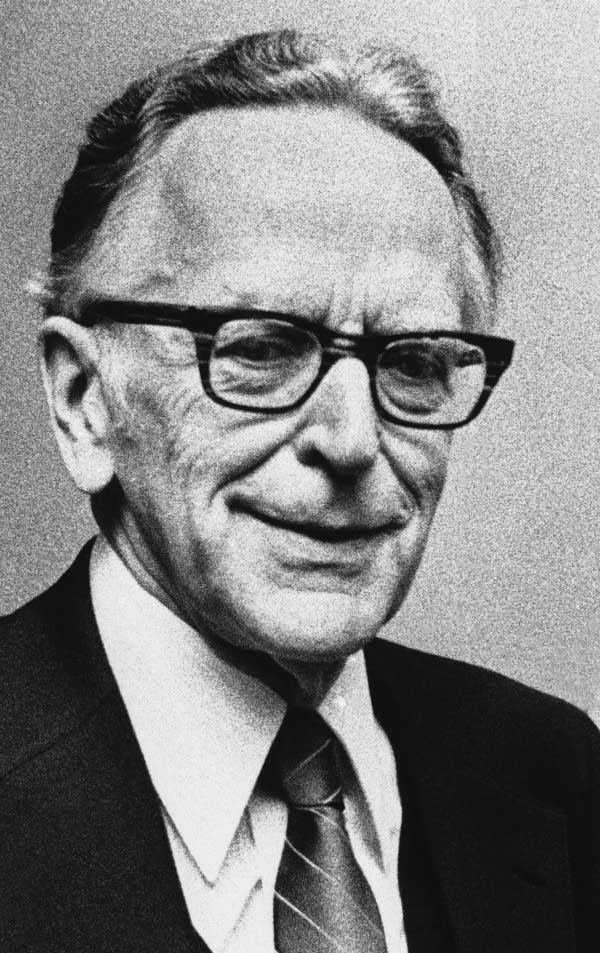
More than 30 years after Maguire’s Freedom Ride, Supreme Court Justice Harry Blackmun spoke at Wesleyan in January 1993 as part of the Hugo L. Black Lecture on Freedom of Expression. Generally perceived as a liberal Justice, Blackmun is best known for authoring the opinion that established a constitutional right to an abortion, Roe v. Wade.
Blackmun was well-received by Wesleyan’s study body. The Argus described Blackmun as having “charmed” the student body and stated that “About 450 students, faculty, trustees and Connecticut legal dignitaries packed Cromwell Concert Hall and another 100 students, unable to get tickets, settled for the audio broadcast.” No protests of Blackmun’s speech were noted.
Unlike when Maguire organized a Freedom Ride in 1961, in 1993, Wesleyan was racially integrated and women could be admitted as students.
Justice Antonin Scalia, an architect of the legal principle originalism, speaks at Wesleyan in 2012; Met With Backlash and Protests From Student Body
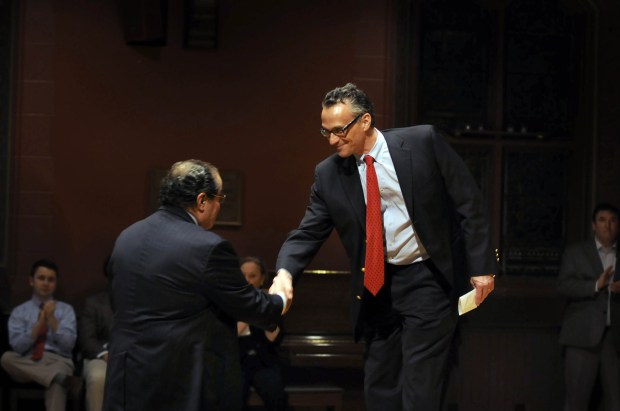
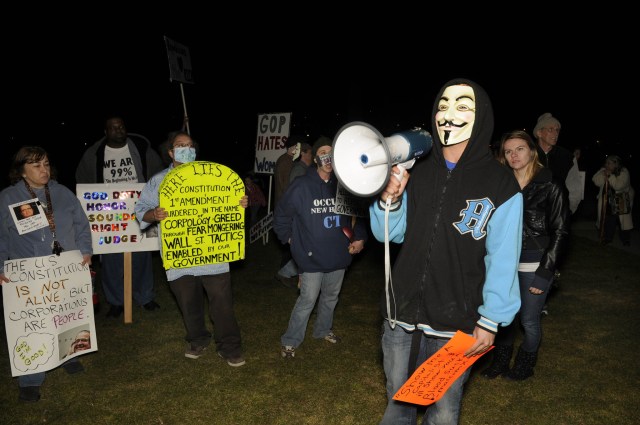
In March 2012, Supreme Court Justice Antonin Scalia gave the Hugo L. Black Lecture on Freedom of Expression. Unlike Blackmun, Scalia – known for his conservative methods of interpreting the Constitution (originalism) and statutes (textualism) – was opposed by many Wesleyan students. A student group known as “Students Against Scalia” was formed to try and stop Scalia from speaking at the university. The Argus ran several articles from this student group opposing Scalia’s visit to Wesleyan including one title: “The Value of Protesting, Disrupting, and/or Silencing Antonin Scalia.”
During Scalia’s speech, protestors stood outside of Memorial Chapel, where Scalia spoke. At one point in Scalia’s speech, he was interrupted by protestors.
“Near the end of the speech, some of the demonstrators dropped banners from the balcony railing. One read, ‘There can be no justice in the court of the conqueror.’ The justice looked up and read it and quipped, ‘Oh, that’s very persuasive.’ About four students who were responsible for the act stood up and walked out. Moments later, four students wearing orange prison jump suits and black hoods, like Guantanamo Bay suits and Abu Ghraib prisoners, stood up and stood silent. They were promptly escorted out.”
The Middletown Press
Following the Court Overturning the Constitutional Right to an Abortion in 2022, Wesleyan Agrees to Cover Abortion-Related Costs for Students
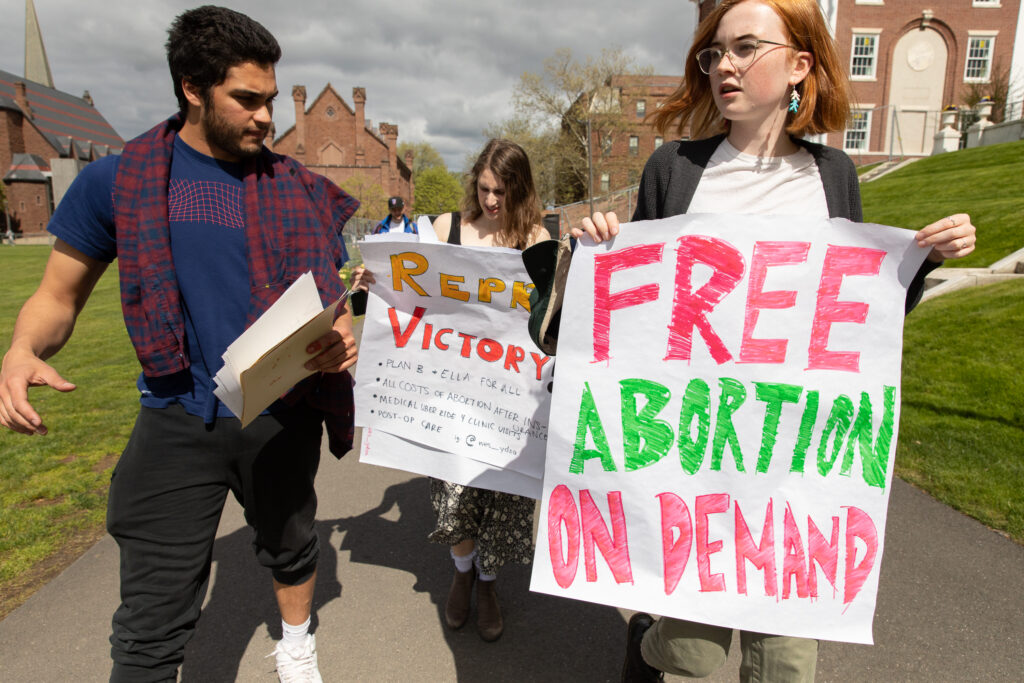
In June 2022, the United States Supreme Court in Dobbs v. Jackson, overturned the constitutional right to an abortion. The Wesleyan Democratic Socialists (WesDS) responded to this decision with progressivism. During the Spring 2023 semester the student group organized a petition calling for the university to pay for abortion, other reproductive health services and their related costs. In total the petition garnered more than 700 student signatures.
In May 2023, the administration agreed to the demands of the student petition and would cover all abortion-related costs, regardless of student’s insurance plans.
Conclusion
Wesleyan’s evolving connection with the United States Supreme Court is a testament to the profound impact of societal changes. The shifting demographics of Wesleyan’s student body, concurrent with the Supreme Court’s evolving jurisprudence, have played a pivotal role in this dynamic relationship.
Historically, Wesleyan had almost an exclusively white and male student body that was primarily Methodist. The student body makeup explains the conservative leanings of many of their students, including future Justice, David Josiah Brewer. From Wesleyan’s founding in 1831 until 1937, the student body agreed with many of the Supreme Court’s decisions because the Court leaned conservative. During the Court’s Lochner-era, from 1897 to 1937, which Brewer was a part of, the Court embraced judicial activism to strike down economic regulations, including child labor laws, minimum wage laws, and regulation of industries. The Lochner-era is generally perceived to have ended in 1937 with the Court upholding state minimum wage laws in West Coast Hotel Co. v. Parrish.
The conservative makeup of the student body resulted in an adversarial relationship with the liberal Warren Court, which began in 1953 and is known for expanding individual rights and civil liberties. Most notably, the Warren Court (1953-1969) found public school segregation to be unconstitutional in 1958 in Brown v. Board of Education. The school’s strained relation with the Warren Court can be seen in the Wesleyan administration’s timid support for Professor David Maguire’s Freedom Ride in 1961, along with older alumni sending threats to Maguire.
By 1965, Wesleyan began actively recruiting African American students. Three years later, the school accepted female students for the first time since 1912. The admission of these students brought about new viewpoints to the study body on the topics of race and gender equality. Many of these students likely embraced the majority of the landmark decisions by the Warren Court. However, the liberal-leaning Supreme Court became more conservative over time with the appointment of new Justices including William Rehnquist (1972), Antonin Scalia (1986), Clarence Thomas (1991) and Samuel Alito (2005). With the appointment of these new deeply conservative Justices, the Court made decisions unpopular with the left including setting restrictions on abortion access – while preserving the constitutional right to an abortion (Planned Parenthood v. Casey, 1992), restraining the ability for Congress to regulate interstate commerce (U.S. v. Lopez, 1995), prohibiting Florida from conducting a recount in the 2000 presidential election (Bush v. Gore, 2000) and expanding gun rights (D.C. v. Heller, 2008).
During the administration of Donald Trump (2017-2021), the Court only got more conservative with the appointment of three new Justices: Neil Gorsuch (replacing Scalia), Brett Kavanaugh (replacing the moderate Anthony Kennedy), and Amy Coney Barrett (replacing the liberal Ruth Bader Ginsburg). These new Justices provided the crucial votes to expand access to firearms (NYSPRA v. Bruen, 2022), overturn the constitutional right to an abortion (Dobbs v. Jackson, 2022), and end race-based affirmative action in college admissions (Students For Fair Admissions v. Harvard/UNC, 2023).
The Wesleyan administration and student body strongly criticized these recent decisions by the Supreme Court. Wesleyan University President Michael Roth panned the Dobbs and Bruen decisions as the Court using “history to justify the political views of an emboldened conservative majority.” President Roth specifically referred to the history used to justify Bruen as “selective reading of history to support a particular strand of gun culture ideology.” Wesleyan Professor and chair of Feminist, Gender, and Sexuality Studies, Victoria Pitts-Taylor writing in The Wesleyan Connection said that the reversal of Roe and Casey sets the stage for restrictions or bans on abortion, which will “endanger the mental and physical health of people who want an abortion, increase mortality rates (especially for Black women), increase poverty and unemployment for those denied abortions, and harm the most vulnerable individuals, families and communities. The Dobbs ruling also paves the way for a national abortion ban.” Finally, after the Court’s decision in Students For Fair Admissions, Roth announced that Wesleyan’s admissions office would end legacy admission preference. Roth noted that while the school would follow the new precedent, Wesleyan would continue to recruit “students, faculty and staff with diverse life experiences, attributes, and points of view.”
Sources
Secondary Sources
Michael J. Brodhead, “David J. Brewer: The Life of a Supreme Court Justice, 1837-1910”, (Carbondale: Southern Illinois University Press, 1994).
Edward M. Rudd, “A One Way Ticket To The Supreme Court“, The Wesleyan Argus, November 13, 1964, https://digitalcollections.wesleyan.edu/islandora/wesleyan-argus-volume-98-number-13-november-13-1964.
“LDF Honors the Life of Board Member John D. Maguire”, NAACP Legal Defense Fund, October 30, 2018, https://www.naacpldf.org/news/ldf-honors-life-board-member-john-d-maguire/.
Keith Donoghue, “Free Speech Advocate Blackmun Charms Crowd”, The Wesleyan Argus, January 26, 1993, https://digitalcollections.wesleyan.edu/islandora/wesleyan-argus-volume-128-number-26-january-29-1993.
David, Lat, “Justice Scalia Goes to Wesleyan”, Above The Law, March 9, 2012, https://abovethelaw.com/2012/03/justice-scalia-goes-to-wesleyan/.
Students Against Scalia, Spotlight on Scalia: Student Speak Out, The Wesleyan Argus, March 6, 2012, https://digitalcollections.wesleyan.edu/islandora/wesleyan-argus-volume-150-number-34-march-6-2012.
Amalie Little, “University Slated to Cover All Abortion-Related Costs for Students Beginning in Fall 2023”, The Wesleyan Argus, May 9, 2023, http://wesleyanargus.com/2023/05/09/university-slated-to-cover-all-abortion-related-costs-for-students-beginning-in-fall-2023/.
Richard W. Garnett, “The Lone Ranger’s Long Game”, City Journal, June 28, 2022, https://www.city-journal.org/article/the-lone-rangers-long-game.
“Wesleyan University: A Brief History”, Wesleyan University, https://www.wesleyan.edu/about/history-traditions/index.html#:~:text=During%20the%201960s%2C%20Wesleyan%20began,as%20exchange%20or%20transfer%20students.
Jocelyn Maeyama and Jesse Nasta, “A Brief Representative History of African American Studies at Wesleyan”, African American Studies, https://magazine.blogs.wesleyan.edu/2019/05/20/a-brief-representative-history-of-african-american-studies-at-wesleyan/.
Lori A. Grinhand, “The Rehnquist Court: A “By the Numbers” Retrospective”, University of Georgia School of Law, April 2007, https://digitalcommons.law.uga.edu/fac_artchop/460/.
Melissa Murray, “Children of Men: The Roberts Court’s Jurisprudence of Masculinity”, Houston Law Review, June 2, 2023, https://houstonlawreview.org/article/77663-children-of-men-the-roberts-court-s-jurisprudence-of-masculinity.
Michael S. Roth, “Don’t Let Judges Use ‘History’ to Erode Our Rights”, Roth on Wesleyan, June 25, 2022, https://roth.blogs.wesleyan.edu/2022/06/25/dont-let-judges-use-history-to-erode-our-rights/.
Victoria Pitts-Taylor, “Finding Hope in 30 Years of Struggle for Reproductive Justice”, The Wesleyan Connection, June 29, 2022, https://newsletter.blogs.wesleyan.edu/2022/06/29/finding-hope-in-30-years-of-struggle-for-reproductive-justice/.
Michael S. Roth, “Wesleyan University to End Legacy Admission”, Roth on Wesleyan, July 19, 2023, https://roth.blogs.wesleyan.edu/2023/07/19/wesleyan-university-to-end-legacy-admission/.
Photos
C.M. Bell, “David Josiah Brewer seated with other Supreme Court Justices- Justice Peckham, Shiras, Harlan, White, Gray, McKenna, Brown and Chief Justice Fuller, 1889”, University of Washington Collections, 1899, https://digitalcollections.lib.washington.edu/digital/collection/portraits/id/1482.
Perry Aycock, “We Shall Not Be Moved: Remembering the 1961 Freedom Rides”, The Associated Press, May 24, 1961, https://apimagesblog.com/historical/2021/8/27/freedom-rides.
Steven John, “The other ‘Minnesota Twins’ Harry Blackmun and Warren Burger”, MPR News, March 13, 2013, https://www.mprnews.org/story/2013/03/13/the-other-minnesota-twins-harry-blackmun-and-warren-burger.
Hartford Courant Staff, “Courant Archives: Justice Scalia Speaks on Constitution At UConn”, The Hartford Courant, March 8, 2013, https://www.courant.com/2006/04/13/courant-archives-justice-scalia-speaks-on-constitution-at-uconn/.
Lesley Cosme Torres, “Wesleyan University says it will pay for abortions and emergency contraception for all students,” WBUR, March 12, 2023, https://www.wbur.org/news/2023/05/12/wesleyan-university-pays-abortion-contraception.
About the author:
Blake Fox is a history major at Wesleyan University. He is a scholar of the United States Supreme Court. His analysis of the Supreme Court on TikTok through the @ConstitutionalLaw account has garnered millions of views and more than 22,000 followers. A published author of many articles on the Court, Blake plans to pursue law school after Wesleyan and eventually practice Supreme Court and appellate litigation.
